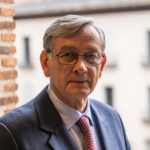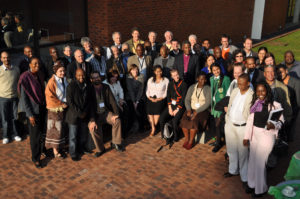On 9 August we recognize and celebrate the indigenous peoples of the world. We salute the decision of the United Nations to focus on COVID-19 and resilience at this critical juncture for the health and well-being of indigenous peoples. It is also a transcendent opportunity to share the practices and cultures of indigenous peoples which have the potential to strengthen the resilience of the entire world.
At World Leadership Alliance-Club de Madrid (WLA-CdM), the world’s largest association of democratic, former Presidents and Prime Ministers, we have been deeply disturbed at how the COVID-19 pandemic is disproportionately ravaging indigenous communities and other identity groups beyond the normal reach of policies and social services. For more than a decade, our Shared Societies Project has called on governments to formulate policies to ensure that excluded vulnerable and minority groups be specifically targeted by institutional and policy efforts which include them as indispensable contributors to multicultural societies which value all members, their cultural traditions and the insights they can share for our greater humanity.
We believe our Shared Societies goals are consistent with the Annex of the United Nations Declaration on the Rights of Indigenous Peoples, adopted by the United Nations General Assembly in 2007:
Affirming that indigenous peoples are equal to all other peoples, while recognizing the right of all peoples to be different, to consider themselves different, and to be respected as such,
Affirming also that all peoples contribute to the diversity and richness of civilizations and cultures, which constitute the common heritage of humankind,
The pandemic has raged, unfortunately, where efforts to reach these standards have been most absent.
For this reason, WLA-CdM is developing a standard-setting declaration on the imperative of equity during global crises to reaffirm the primacy of directing support to the most vulnerable and excluded, including indigenous peoples. We call it WLA-CdM Principles on Equity during Global Crises and it lays out principles for inclusive responses in the public health, economic resilience and for public rhetoric that does not disrespect diverse peoples, including indigenous populations, so often subjected to xenophobia, racism and exclusion. The re-affirmation of such principles is crucial given both the immediate threat of the pandemic and the emerging opportunity for building back a better world.
To achieve this transformative scenario, we will need to take advantage of the rich perspectives that the world’s indigenous peoples offer to us all. We often think of resilience in terms of how indigenous peoples have faced adversity and survived with and through their cultural integrity. This is also a moment where the learning and traditions of indigenous cultures are critical for the resilience – a term which means ‘springing back’ – of the rest of the world.
For example:
-The societies that have been most effective in containing the COVID – 19 pandemic to date have been ones in which inclusive leadership, social trust and cohesive bonds among people have facilitated the implementation of preventive policies and behaviors. The Eastern Band of the Cherokee Indians in North Carolina have produced better health outcomes than surrounding communities in the state to date by a) unified community mobilization, which began even before the first death from coronavirus in the United States, when tribal health officials realized the potential magnitude of the pandemic’s impact on the Cherokee nation; b) a proactive, organized approach by the tribal government to testing, tracing, isolation and lock-downs prior to official guidelines for doing so; c) aggressive medical preparation; and d) economic support for those at home without the ability to work.
-For several decades now, restorative justice practices learned from indigenous peoples have helped societies reincorporate those who have transgressed legal norms, adding a holistic perspective to punitive systems of criminal justice in places ranging from Australia to Canada to Guatemala to New Zealand.
-Perhaps most importantly, the cosmovision of many indigenous peoples in the natural world in which we live, placing humans within nature and not as separate entities with relationships to nature, offers insights and parameters for adapting human behavior before the terrible cataclysm of climate change becomes irreversible.
These are just a few examples among the many things we can and must learn from indigenous peoples for the greater good of all humankind. In this sense we understand that the imperative of resilience today is not just for the cultural survival of indigenous peoples but for survival of humanity across the planet. If we are to flourish as a species, we must apply the learning and best practices of the accumulated experience of indigenous peoples.
Thank you and all the best from the WLA-CdM on this International Day of the World’s Indigenous Peoples.
Danilo Türk, President of Club de Madrid and President of Slovenia (2007-2012).

Laura Chinchilla, Vice President of Club de Madrid and President of Costa Rica (2010-2014).



